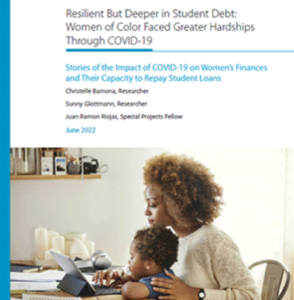New Report Examines The Disparate Impact of COVID-19 on Student Loan Debt for Women
Posted on Aug 24, 2022 | Comments 0
 A new study by the Center for Responsible Lending finds that women carry about two-thirds of the $1.7 trillion of federal student loan debt. The COVID-19 crisis has exacerbated the financially unstable positions of many women.
A new study by the Center for Responsible Lending finds that women carry about two-thirds of the $1.7 trillion of federal student loan debt. The COVID-19 crisis has exacerbated the financially unstable positions of many women.
The center’s research sought to analyze how women’s finances have changed over the course of the past two years and what implications these changes have had on women’s long-term financial well-being and their ability to repay outstanding education debt.
The findings indicate the widespread disruption in employment due to the pandemic has had on women, their families, and their finances. Despite demonstrating immense resiliency, the worst outcomes have disproportionately harmed women of color. Black women are more than twice as likely as White men to owe more than $50,000 in undergraduate student loan debt.
The researchers found that:
- Due to increased childcare responsibilities, as well as the high-contact, low-wage nature of many women’s occupations, women of color and women in jobs who could not go remote have less job security today than pre-pandemic.
- The economic gains made through 2021 were not shared equally across racial groups. Women of color continue to experience financial hardship paying for necessities.
- Student loan debt burdens remain at staggering levels, despite the payment pause. Black women borrowers typically have higher student loan balances than White women, making repayment more difficult.
- Because of the difficulties faced repaying their student loans, women are reluctant to incur more student loan debt for themselves or their children.
The authors conclude that “recognizing that the COVID-19 crisis has reshaped women’s relationship to work and their ability to save for the future, it is essential to tailor policy solutions that will enable women to meet their short-term financial obligations and not have outstanding student loan debt encumber long-term financial planning.”
The full study, “Resilient But Deeper in Student Debt: Women of Color Faced Greater Hardships Through COVID-19,” may be downloaded here.
Filed Under: Research/Study








